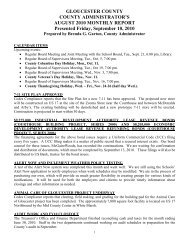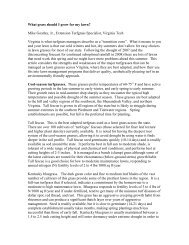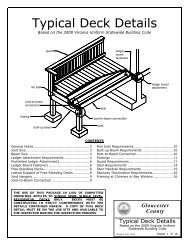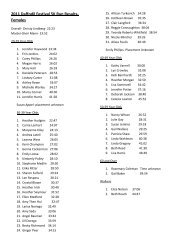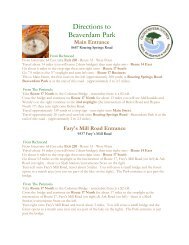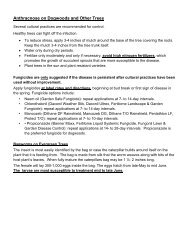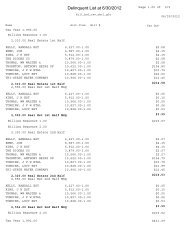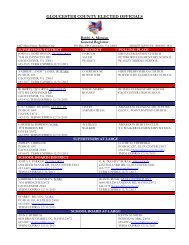Virginia Cooperative Extension- York County - Gloucester County ...
Virginia Cooperative Extension- York County - Gloucester County ...
Virginia Cooperative Extension- York County - Gloucester County ...
You also want an ePaper? Increase the reach of your titles
YUMPU automatically turns print PDFs into web optimized ePapers that Google loves.
<strong>Virginia</strong> <strong>Cooperative</strong> <strong>Extension</strong>- <strong>York</strong> <strong>County</strong>
Pruning Deciduous Shrubs<br />
• Need to know your shrubs<br />
Spring Blooming<br />
Summer Blooming<br />
<strong>Virginia</strong> <strong>Cooperative</strong> <strong>Extension</strong> – <strong>York</strong> <strong>County</strong><br />
Invent the Future<br />
www.yorkcounty.gov/vce<br />
890-4940 / www.ext.vt.edu / ex199@vt.edu
Vegetable Gardening<br />
on the Peninsula
Why Grow Vegetables?<br />
• Healthy plants grown in healthy<br />
soil are nutritious.<br />
• Vegetable gardening helps keep<br />
you in touch with the cycles of<br />
nature.<br />
• You can grow varieties not<br />
available in the local super<br />
market.
Who Will Get to Play in the Garden?<br />
• Will this be a family effort? !<br />
• Remember the summer months<br />
• July 19, 95 degrees, 0 wind speed,<br />
87% humidity<br />
• Dad tills, mom plants, kids harvest<br />
• Neighborhood effort<br />
• Hired hand?
What Does Your family Like to Eat?<br />
• Tomatoes?<br />
• Leafy Greens Vegetables?<br />
• Radishes?<br />
• Beans?<br />
• Cantaloupes, Melons?<br />
• Peppers?
How Much Do You Need to Grow?<br />
• Enough for fresh consumption<br />
• Enough for preservation<br />
• Neighborhood good will<br />
• Wildlife, Disease, and Insects<br />
• Storm events: Hail, Strong Winds
How Much Land/Space is Available?<br />
• 10’ X 20’, 5’ X25’<br />
• Containers<br />
• Land in the Neighborhood<br />
• A Section in Dad’s Garden
Selecting the Site<br />
• Six hours of sunlight each day (major<br />
disappointment if not considered)<br />
• Be aware of microclimates (fencing, close<br />
to the house, a low spot in the landscape)<br />
• Avoid trees, shrubs, and traffic areas<br />
• Look for deep, friable soil (find your best<br />
soil)
N<br />
a.m.
House<br />
Garden<br />
Play Area<br />
N
Be Successful: Manage What You<br />
Started<br />
• Begin with a small plot and expand<br />
later.<br />
• Even one hundred square feet can<br />
provide a family of three with fresh<br />
vegetables.<br />
• Be successful first so that you will<br />
continue to increase your skills.
Soil Fertility<br />
• pH<br />
• Organic Mater<br />
• Fertilizers<br />
• Mulches
pH<br />
1 2 3 4 5 6 7 8 9 1 0 11 12 13 14<br />
Ideal pH range for vegetable gardens<br />
6.0- 7.0<br />
On the pH scale, 7 is neutral.<br />
Add pulverized limestone to increase pH.<br />
Add sulfur to decrease pH.
Understanding the Fertilizer Label<br />
10-10-10<br />
N Nitrogen<br />
Leaf growth<br />
P Phosphorous<br />
K Potassium<br />
Root growth<br />
Flower development<br />
Plant stress tolerance<br />
Promotes cold hardiness
Basic Fertilizer Recommendation<br />
• Add 1 pound of 10-10-10 per<br />
100 square feet<br />
• Add 2 pounds of 5-10-5 per<br />
100 square feet
Why pH is Important?<br />
• Most vegetables do best in<br />
slightly acid soil of pH 6.0 to 7.0.<br />
• pH outside this range affects<br />
availability of essential nutrients.<br />
• Plants stressed by growing at the<br />
wrong pH are more likely to<br />
attract insect damage.
Spring Planting Guides<br />
Average last spring frost for your area.<br />
Tidewater VA: April 1 to 21<br />
6 5 4 3 2 1 1 2 3 4 5 6 7 8 9 1 1 1 1 1 1 1 1 1 2<br />
0 0 0 0 0 0<br />
0<br />
0 0 0 0 0 0 0 0 0 0 2 3 4 5 6 7 8 9 0<br />
0 0 0 0 0 0 0 0 0 0<br />
Plant Harvest Beets
Growing Season<br />
• Equals the number of frost free days:<br />
– Average last frost date in spring:<br />
• April 1 to 21<br />
– Average first frost date in fall:<br />
• November 8 to 28<br />
– Average number of frost free days:<br />
• 230 day<br />
– Ref: MG Handbook, p. 300
Starting Seeds Indoors<br />
• Starting medium: Vermiculite or a<br />
seed starting mix based on peat<br />
• Germination temperature of about 75<br />
deg. F (top of the water heater is<br />
about right)<br />
• Pot up when first true leaves appear<br />
if using Vermiculite--then use dilute<br />
liquid fertilizer
Growing Seeds Indoors<br />
• Shop lights: bank of three suspended about 2”<br />
above the seedlings, 16 hr. on, 8 hr. off<br />
• Keep the soil moist.<br />
• Water with soluble fertilizer weekly
Steps to Ready the Garden<br />
Cultivate soil to depth of 6 inches<br />
Incorporate organic amendments to<br />
a depth of 2 inches<br />
Apply recommended fertilizer and lime<br />
Rake level remove rocks and debris
Vegetables to Start Indoors<br />
Broccoli<br />
Brussels<br />
Sprouts<br />
Cabbage<br />
Cauliflower<br />
Eggplant<br />
Tomatoes<br />
Lettuce<br />
Peppers<br />
Swiss Chard<br />
Herbs<br />
Chinese<br />
Cabbage<br />
Celery
Plant These Vegetables Directly<br />
Pole Beans<br />
Bush Beans<br />
Lima Beans<br />
Peas<br />
Collards<br />
Spinach (spring &<br />
fall to winter over)<br />
Carrots<br />
Cucumber<br />
Melon<br />
Squash<br />
Kale<br />
Okra<br />
Corn<br />
Turnips<br />
Beets
Planting the Garden<br />
• Direct Seeded<br />
• Harden seedlings off.<br />
• Water seedlings ahead.<br />
• Plant out late in afternoon or on<br />
cloudy day.<br />
• Plant at soil level--press soil firmly<br />
around roots.<br />
• Water the newly planted seedling
Watering the Garden<br />
Direct seeding into the garden.<br />
Watering the garden
Extending the Season<br />
• Cold Frames are miniature greenhouses<br />
– Can be heated with tape<br />
– Plant lettuces in August for winter eating<br />
• Cloches and tunnels for field crops<br />
• Floating row covers<br />
– Provide 5 deg of frost protection<br />
– Keep insects and critters from tender<br />
crops
Cold Frames
More Cold Frames
Tomatoes<br />
• Reduce incidence of tomato spotted<br />
wilt virus (tswv)<br />
• Raise your own plant (tswv resistant)<br />
• Protect plants with mulch<br />
• Do not allow tobacco products near<br />
your plants, including nicotianna,<br />
petunias and related<br />
• Wash hands before entering the<br />
garden
No Stress
Reduce Insect Populations<br />
• Spun woven fabric covers<br />
• Planting timing<br />
• Crop rotation (not practical)<br />
• Sanitation<br />
• Weed Control<br />
• Insecticidal Soaps
Upcoming <strong>Extension</strong> Events<br />
• Weekends in February, Free Pruning<br />
Clinics<br />
• Mondays in March, 4-H Lawn Mowing<br />
• March 13, Horticultural Extravaganza<br />
• April 10, Garden Symposium<br />
• April, Plant Health Clinics<br />
• May 1, <strong>York</strong> <strong>County</strong> M G Plant Sale<br />
• www.yorkcounty.gov/vce
Thank you<br />
Questions???<br />
<strong>Virginia</strong> <strong>Cooperative</strong> <strong>Extension</strong>-<strong>York</strong> <strong>County</strong><br />
100 <strong>County</strong> Drive<br />
(757) 890-4940<br />
ex199@vt.edu<br />
www.yorkcounty.gov/vce



